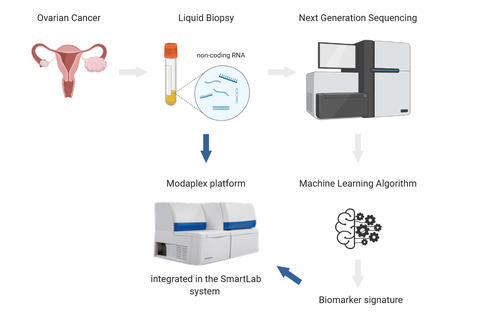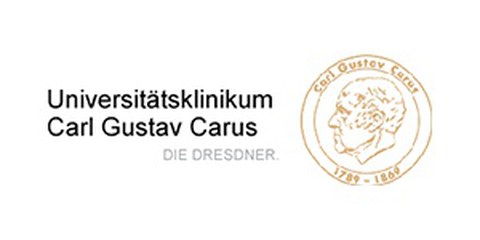Smart Translation – Optimizing of diagnostics within the field of personalized oncology through developing an efficient system of analysis to explore, validate and translate new olecular-biological biomarkers and their integration into the SmartLab
Precision medicine offers the possibility of an individual and thus best possible therapy. In the field of oncology, this means the increased chances of progression-free survival (PFS). Ovarian cancer is the leading cause of death amongst gynecological malignancies and is in the focus of the current research project. There are different types of ovarian cancer which are classified by the type of mutated cell from which they start. This impedes both the therapeutic decision and the prediction of therapeutic success. The mortality rate of affected women is around 80 %.
The goal of primary surgery is to resect as much tumor tissue as possible. Bevacizumab, an anti-angiogenic antibody, prevents the vascularization of the tumor tissue and is given supportively to the subsequent chemotherapy in most cases. Clinical studies proved an increase in the PFS but the antibody showed numerous side effects, too. The establishment of predictive biomarker signatures for forecasting the response of a certain therapy is an unmet clinical need.
In this interdisciplinary research project, new Machine Learning Algorithms will be developed to identify biomarker signatures from Next Generation Sequencing data sets (sub-topic of TU Dresden, Institute of Artificial Intelligence). The focal point of research here is circulating nucleic acids which can be found in liquid biopsies like blood, serum or urine. Based on expression profiles from NGS data sets of non-coding RNA (ncRNA), unique biomarker sets for a specific subtype respectively for a therapeutic response will be identified. A personalized treatment recommendation for the subsequent therapy and therefore an increased PFS could derive from this approach. The Clinic and Polyclinic for Gynecology and Obstetrics (University Hospital Carl Gustav Carus Dresden) is the clinical partner in this research project

Workflow of the interdisciplinary research project SmartTranslation. Non-coding RNAs (ncRNA) from liquid biopsy samples serve as the starting point. New Machine Learning Algorithms are developed to identify prognostic biomarker sets based on ncRNA expression profiles. Identified prognostic biomarker signatures together with state-of-the-art laboratory automation might help to decide faster for successful therapeutic approaches.
A conventional quantitative PCR (qPCR) does not allow the identification of complex biomarker signatures. NGS is always costly, lengthy and provides a surplus of data, which necessitates a time-consuming analysis. The Modaplex technology (Biotype GmbH) fills the diagnostic gap between qPCR and NGS. This platform provides a multiplex PCR combined with concurrent capillary electrophoresis. Thus, up to 50 targets can be quantified simultaneously in one well.
The Modaplex platform will be integrated into the SmartLab system, too. Key elements in this sub-project are the optimization of the sample preparation, the automation of these preparatory steps as well as the realization of a continuous sample supply. With the Internet of things approach apart from automation digitalization should be addressed, too. In this project, digitalization means the interlink of all devices, data storage, data processing and interpretation and connection to the hospital information system (sub-project TU Dresden, Chair of Bioprocess Engineering, Research group SmartLab systems).
Project funding:
Sächsische Aufbaubank - Verbundprojektförderung
grant number: 100392495
Project head:
 © Mann
© Mann
Project researcher
NameDr.-Ing. Felix Lenk
Head of SmartLab-systems
Send encrypted email via the SecureMail portal (for TUD external users only).
Project staff:
 © Mann
© Mann
Project researcher
NameDipl.-Ing. Christoph Otto
SmartLab-systems, lab automation
Send encrypted email via the SecureMail portal (for TUD external users only).
 © Mann
© Mann
Project researcher
NameSaskia Reichelt M.Sc.
SmartLab-systems, PoC test development
Send encrypted email via the SecureMail portal (for TUD external users only).
Cooperation partners:
TU Dresden, Institute of Artificial Intelligence, Chair of Scientific Computing for Systems Biology
University Hospital Carl Gustav Carus, Clinic and Polyclinic for Gynecology and Obstetrics
Project term:
30.12.2019 - 28.02.2022




